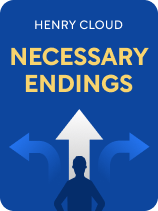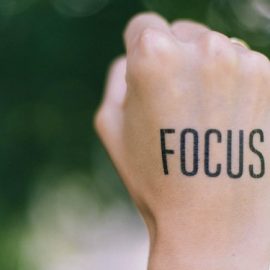

This article is an excerpt from the Shortform book guide to "Necessary Endings" by Henry Cloud. Shortform has the world's best summaries and analyses of books you should be reading.
Like this article? Sign up for a free trial here.
Do you have to make a hard decision that you don’t want to go through with? Do you lose focus with deal with a hard situation?
Ending something as big as a job or a relationship isn’t easy. There will be factors that will try to persuade you from moving on, but eventually, you’ll have to build the courage to take action.
Learn how to make hard decisions that will ultimately be good for you in the long run, according to Necessary Endings by Henry Cloud.
Create Structures That Encourage Action
As you move toward ending a situation or relationship, you’ll want to create structures that keep you engaged in the process. These structures will ultimately help you learn how to make hard decisions. Cloud notes that it’s easy to lose focus when dealing with difficult situations. Because these situations are painful, we naturally want to focus elsewhere, which can lead us to delay making important changes.
To stay focused on the problem situation, regularly schedule time to work on the problem, and set deadlines for taking action. Regularly scheduling time to work on the problem helps you avoid losing focus, and setting deadlines helps ensure that you don’t delay your endings indefinitely.
It can be helpful to bring other people in to hold you accountable to your decisions. Cloud argues that people who aren’t directly involved are less likely to avoid the problem and can help to keep you motivated.
For example, if you need help ending a dead-end job, you could set a deadline with someone who will keep you accountable, such as a friend, coworker, or family member. While on your own it might be easy to delay putting in your two weeks’ notice, having a friend to call you out can help redirect your focus.
| Expert Tips for Ending Problem Situations If you’re nervous about approaching a tough situation, it may help to take a direct approach to communication. Psychologists argue that people avoid difficult conversations because they’re a lot of work for the brain to handle. To get over that mental hurdle, experts recommend a direct approach, being candid with everyone involved about your feelings regarding the situation. Immediately and directly addressing the issue opens communication and helps others to engage respectfully, even if they disagree with you. In addition to communicating directly, create a schedule that will allow you to handle the situation with maximum productivity. Schedule time early in the day, and allot more time than you think you’ll need. Experts note that you’re more likely to be energized and productive earlier in the day. And, allotting extra time ensures that you’ll have enough time to handle things even if you’re interrupted or experience unexpected complications. Once you’ve laid out a schedule for dealing with the problem, you’ll want to bring on another person to keep you accountable to that schedule. However, think carefully before choosing a friend. Your accountability partner should be someone who is ready to push you and call you out when necessary, and sometimes friends are simply too kind to push you as hard as you need. If you’re considering choosing a friend, think carefully about whether that person is willing to be blunt and honest enough to hold you accountable. |
Focus on What You Can Control to Avoid Losing Motivation
As you take action to end things, take care not to lose your motivation to deal with difficult situations. According to Cloud, it’s easy to lose motivation when a situation includes circumstances outside of your control. The more you ruminate on unfortunate circumstances, the more you’ll feel that there’s nothing you can do to improve your situation. This leads to feelings of apathy that can stop you from acting. To avoid falling into this trap, focus on the elements of a situation that are within your control. Cloud argues that focusing on the things you can control helps to convince your brain that you have the power to influence the situation, which in turn empowers you to act.
Suppose that your business is struggling due to rising inflation. If you choose to focus on the negative effects of inflation, you’ll wind up feeling powerless, as there’s nothing you can do to steer the global economy. However, if you instead choose to focus on the things your business can do to cut costs and increase revenue during this time, you’ll likely see that you have many options for dealing with the situation.
(Shortform note: Experts note that it’s important to focus on the things you can control because doing so reduces interference, which refers to distractions that pull you out of a focused, productive state. As you focus on the things you can control, you’ll also want to avoid comparing yourself to others, which is now easier than ever in the age of social media. Comparing yourself to others leads you to focus unduly on the result, instead of the process you need to follow to get there. To avoid this, focus on your individual goals, and don’t adjust those goals or change your trajectory no matter what your peers may be doing.)

———End of Preview———
Like what you just read? Read the rest of the world's best book summary and analysis of Henry Cloud's "Necessary Endings" at Shortform.
Here's what you'll find in our full Necessary Endings summary:
- That pulling out of a bad situation is the best way to move forward in life
- How to assess which situations and relationships need to end
- How to make sure that your endings stick






